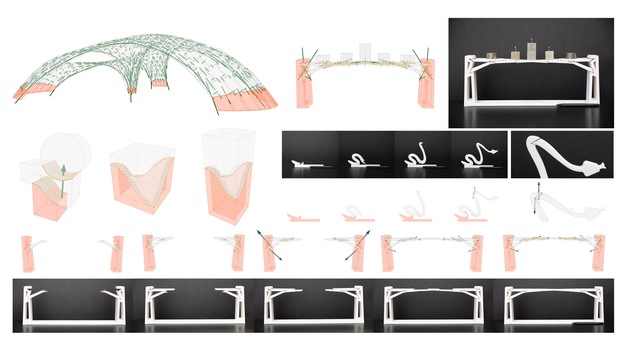This dissertation presents a new numerical solver with an assembly-aware design workflow to help users better design and build discrete shell structures. Discrete shell structures are aesthetically ravishing but challenging to design and build efficiently. Although discrete structures can be prefabricated using efficient material and increasing productivity on-site, building discrete shell structures typically requires extensive scaffolding during their assembly process, which is associated with massive material and energy waste. Moreover, discrete shell structures usually require additional design steps normally not necessary with standard continuous structures, such as shape discretisation and stability analyses during and after construction.
The state-of-the-art stability solver rigid-block equilibrium (RBE) method uses quadratic programming with penalty formulation to measure structural infeasibility. For unstable structures, RBE provides a solution with a tensile force at the unstable regions, which gives a quantified measure of instability. Moreover, this dissertation extends the RBE method with some prominent features to thoroughly understand its optimisation results and mechanical meanings. Several experiments are performed and studied, including comparing the original quadratic with a linear function to illustrate nodal forces and interface resultants’ roles and reducing the structure’s contact interface into its kern area to explore different admissible internal stress states.
However, although RBE has various benefits that can be applied to the design problem, it incorrectly assesses unstable structures as stable when complex interface geometries are involved. Therefore, this dissertation provides insight into the RBE flaws, builds upon its strengths, and presents a new robust solver that overcomes the problem. Our newly proposed coupled rigid-block analysis (CRA) solver combines equilibrium and kinematics in a nonlinear programming problem. Furthermore, similar to RBE, CRA with penalty formulation makes it possible to measure infeasibility and gives valuable information to users to change their design. Comparing a wide range of benchmarks with commonly used commercial software shows CRA’s robustness and accurate mechanical description of the complex three-dimensional discrete-element assemblies formed by rigid blocks.
Utilising CRA, this dissertation proposes a stability-aware design process to iteratively help the user and guide their design towards structurally-sound assemblies. Embedding stability-aware design process, an assembly-aware design (AAD) is further proposed to allow the user to consider the assembly sequence while designing discrete shell structures. Several computational and physical models were designed and assembled with limited scaffolding using our proposed workflow to verify our research findings in real-world scenarios. Finally, our CRA solver is publically available as an open-source Python package — COMPAS CRA — to help researchers and designers around the globe to build better discrete shell structures upon our work.




